Smooth Talk Blu-ray Movie
HomeSmooth Talk Blu-ray Movie 
Criterion | 1985 | 92 min | Not rated | Feb 23, 2021
Movie rating
7.2 | / 10 |
Blu-ray rating
| Users | 0.0 | |
| Reviewer | 4.0 | |
| Overall | 4.0 |
Overview
Smooth Talk (1985)
Connie Wyatt is a teenager who spends her summer days moping around the house and exploring her sexuality in the Northern California suburbs. But the thrills and innocence of youth are forever shaded by the predatory behavior of an older man named Arnold Friend whom she encounters at a drive-in.
Starring: Treat Williams, Laura Dern, Mary Kay Place, Levon Helm, Elizabeth BerridgeDirector: Joyce Chopra
| Drama | Uncertain |
| Romance | Uncertain |
| Thriller | Uncertain |
Specifications
Video
Video codec: MPEG-4 AVC
Video resolution: 1080p
Aspect ratio: 1.85:1
Original aspect ratio: 1.85:1
Audio
English: LPCM Mono (48kHz, 24-bit)
Subtitles
English SDH
Discs
Blu-ray Disc
Single disc (1 BD)
Playback
Region A (locked)
Review
Rating summary
| Movie | 3.5 | |
| Video | 5.0 | |
| Audio | 5.0 | |
| Extras | 4.0 | |
| Overall | 4.0 |
Smooth Talk Blu-ray Movie Review
Reviewed by Dr. Svet Atanasov January 26, 2021Joyce Chopra's "Smooth Talk" (1985) arrives on Blu-ray courtesy of Criterion. The supplemental features on the disc include new interviews with the director, Treat Williams, Laura Dern, and Joyce Carol Oates; three short films; reading of an archival article by by Don Moser; trailers; and more. In English, with optional English SDH subtitles for the main feature. Region-A "locked".
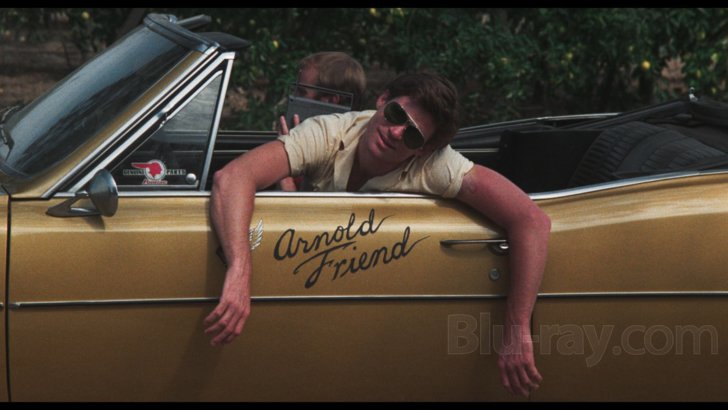
Hey babe, I am going to be your lover. You just don't know it yet.
A couple of short sequences solidify the identity of Joyce Chopra’s film Smooth Talk. But most viewers ignore their significance, which is why they eventually incorrectly conclude that it is a coming-of-age dramedy. It is more than that. The young girl’s flirtations occupy a large part of the narrative, but they are not what makes the film interesting.
Chopra sets her film in a small town somewhere in Northern California during the 1980s. It is summer and it is hot. Romance is also in the air and fifteen-year-old Connie (Laura Dern) can feel it with every fiber of her being. At home, when no one can see her, she practices the ancient art of seduction and imagines how she would steal the heart and mind of the next cute boy she meets at the local mall. She is determined to be the best she could be so that she won’t have to compete with her two girlfriends. If she chooses a boy, it should be a wrap -- she wins, not one of her girlfriends, and later on she figures out what to do with him.
At the mall, the boys easily recognize Connie’s efforts and virtually all of them respond as she expects, but the thrills are not as intense as she had imagined they would be. It is why she eventually convinces her girlfriends to start hanging out with her at Frank’s, a popular roadside diner where older boys like to pick up older girls. The thrills prove different, just as Connie had hoped they would be, but when one of the regulars at Frank’s takes her for a quick ride and begins touching her body, she panics and runs away. A few days later, while her parents and sister are gone, Connie is visited by Arnold (Treat Williams), a buffed-up troublemaker, who looks twice her age. He flirts with her, a lot like she does with the boys at the mall, and then tells her that even though she does not know it yet, he is going to be her lover.
Two-thirds of Smooth Talk are so casual and good-hearted that it is not at all surprising to see that it is often being profiled as a coming-of-age film. Connie and her two girlfriends are driven by feelings and sensations that make them feel so alive they often appear borderline euphoric. The boys in the mall are exactly like them – flirty, joyous, ready for romantic adventures they will remember for the rest of their lives. Before Williams’ character emerges, it very much looks like the entire film would be about the games teenagers play while they try to connect and get comfortable with their sexuality.
But amidst the flirtations and meaningless chatter Chopra’s camera repeatedly highlights the failure of Connie’s parents to grasp what she is going through. Sometimes it is a very short sequence where Connie’s mother scolds her for revealing her excitement; sometimes it is a longer sequence where her father intentionally exits a situation in which the girl expects him to be logical and show signs of authority. Any good and experience parent would instantly recognize the red flags because they are way too obvious. The disconnect then isolates Connie and trouble enters her life.
The two key sequences that alter the film’s identity, however, do not feature Williams’ character. At that point the incoming damage is already impossible to prevent. He is the product, if you will, of the failures that happen earlier. The fist sequence comes very early, when Connie’s mother hands her cash on her way to the mall. She utters only a couple of words, but there is so much venom in them it instantly becomes crystal-clear that the trust that needs to exist between them so that the two can have a functional relationship is gone for good. (The film then offers clues revealing that the mother is dealing with personal issues that come from a dysfunctional relationship with her husband. Painting the house is her quiet therapy, but just like her daughter she craves intimacy that isn’t happening). The second sequence comes shortly after Connie and one of her girlfriends lie that they are at the local cinema and instead visit Frank’s. She is spotted by her father and later on, when questioned about the trip, his indifference confirms to her that she is skilled and old enough to manufacture legit reasons that excuse her lies. (In other words, the father’s actions have pushed Connie in the same hypocritical relationship he has with her mother, minus of course the intimacy).
A very lazy deconstruction will unquestionably emphasize the dramatic events at the end and speculate that it is there that Chopra’s film veers off in a new direction and perhaps becomes something more than a coming-of-age dramedy. But it isn’t so. Right from the get-go the film heads in the only possible direction and, in the process, prepares for what is to come. William’s character isn’t the only guilty party in it and it is why this film is so interesting to analyze. It is really like a textbook on bad parenting that repeatedly quizzes its audience.
Smooth Talk Blu-ray Movie, Video Quality 
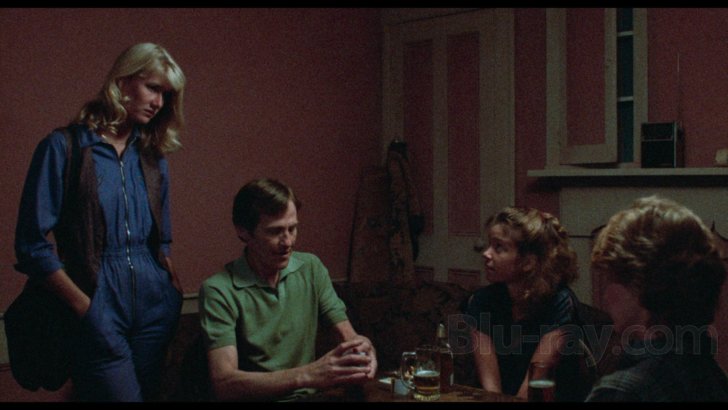
Presented in its original aspect ratio of 1.85:1, encoded with MPEG-4 AVC and granted a 1080p transfer, Smooth Talk arrives on Blu-ray courtesy of Criterion.
The following text appears inside the booklet that is provided with this Blu-ray release:
"This new digital transfer was created in 16-bit 4K resolution on a Lasergraphics Director film scanner from the 35mm original camera negative. Thousands of instances of dirt, debris, scratches, splices, and warps were manually removed using MTI Fim's DRS, while Digital Vision's Phoenix was used for jitter, flicker, small dirt, grain, and noise management. The original monaural soundtrack was remastered from the 35mm dialogue, music, and effects magnetic track using Avid's Pro Tools and iZotope RX.
Transfer supervisor: Joyce Chopra.
Colorist: Lee Kline/Criterion Post, New York."
The exclusive new 4K master that was prepared for this release is wonderful. The original cinematography incorporates different varieties of natural light that produce some very beautiful organic contrasts that look gorgeous in 1080p. However, I also think that if viewed in native 4K the film will look even better, with the indoor parts where warm sunlight/daylight sneaks in creating some of the most gentle nuances (see screencaptures #5 and 7). Grain exposure varies a lot for the exact same reasons, so expect to see plenty of very interesting tonal shifts. There are no traces of problematic digital corrections. The color grading job is excellent. In fact, even while the girls are still on the beach and the credits continue to appear on the screen, it is already painfully obvious that the new master was graded with impressive precision. There are no stability issues. Finally, the entire film looks spotless. (Note: This is a Region-A "locked" Blu-ray release. Therefore, you must have a native Region-A or Region-Free player in order to access its content).
Smooth Talk Blu-ray Movie, Audio Quality 
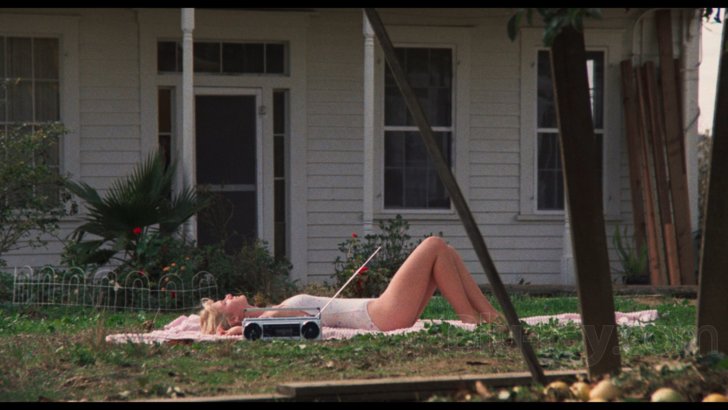
There is only one standard audio track on this Blu-ray release: English: LPCM Mono (48kHz, 24-bit). Optional English SDH subtitles are provided for the main feature.
Even though there are a few sequences with interesting dynamic movement, the film does not have a prominent soundtrack. Towards the end where Treat Williams' character appears with his pal a few rock tunes do slightly more to produce decent temporary contrasts, but everywhere else there are plenty of organic sounds and noises that are tasked to build and support the film's intended atmosphere. The dialog is always clean and clear. There are no stability issues, or other conventional age-related imperfections to report in our review.
Smooth Talk Blu-ray Movie, Special Features and Extras 
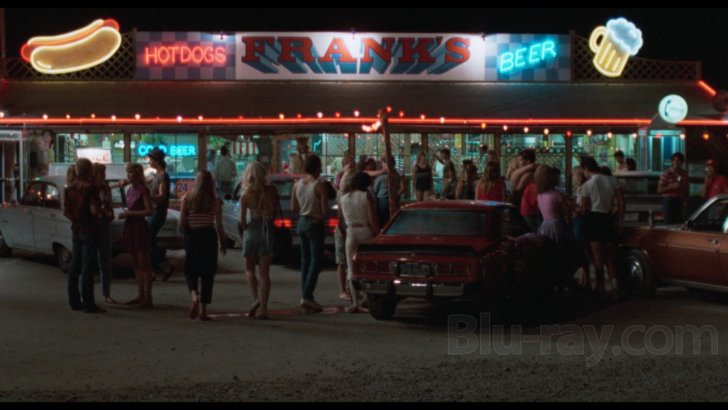
- Trailers - in English, not subtitled.
1. Vintage trailer. (3 min, 1080p).
2. Re-release trailer for the 4K restoration of the film, prepared in 2020. (2 min, 1080p).
- Joyce Chopra - presented here are two interviews with director Joyce Chopra.
1. Interview One - in this new interview, Joyce Chopra recalls how she entered the film business and discusses the evolution of her work as well as some of the key themes in it, like parenting. Also, there are some interesting comments on the struggle to be a parent and filmmaker at the same time. The interview was conduced in 2020. In English, not subtitled. (17 min, 1080p).
2. Interview Two - in this archival audio interview, Joyce Chopra discusses the original story by Joyce Carol Oates that inspired Smooth Talk and its conception. The interview was conducted right before the film's theatrical premiere for KPFK Radio in 1985. In English, not subtitled. (30 min, 1080p).
- The Women of Smooth Talk - presented here is a filmed online Q&A session with Joyce Chopra, Laura Dern, and actor Joyce Carol Oates, which was held after a screening of the 4K restoration of Smooth Talk at the 58th New York Film Festival in 2020. The bulk of the comments address the short story that inspired the film, some of the key themes in it, and cinematographer James Glennon's work on the film. In English, not subtitled. (57 min, 1080i).
- Joyce Chopra, Mary Kay Place, and Treat Williams - presented here is a filmed online Q&A session in which Mary Kay Place, Treat Williams, and Joyce Chopra discuss the power plays and dilemmas that emerge from them that are at the core of Smooth Talk. The session was filmed in November 2020. In English, not subtitled. (23 min, 1080p).
- Short Films - three short films directed by Joyce Chopra. In English, not subtitled.
1. Joyce at 34 - codireced with Claudia Weill in 1972. (28 min, 1080i).
2. Girls at 12 - directed in 1975. (30 min, 1080p).
3. Clorae and Albie - directed in 1975. (37 min, 1080p).
- Production Design with David Wasco - in this new program, production designer David Wasco discusses his background and contribution to Smooth Talk. The program was created for Criterion in October 2020. In English, not subtitled. (19 min, 1080p).
- The Pied Piper of Tucson - presented here is an article by Don Moser which initially appeared in the March 4, 1966 issue of Life magazine. Author Joyce Carol Oates cites this tale of the serial killer Charles Schmid Jr's killing spree as inspiration for her short story, "Where Are You Going, Where Have You Been?", on which Smooth Talk is based. Audio only. In English, not subtitled. 40 min, 1080p).
- Booklet - 46-page illustrated leaflet featuring an essay by poet and memoirist Honor Moore, a 1986 New York Times article by Oates about the adaptation, and Oates's 1966 short story "Where Are You Going, Where Have You Been?", as well as technical credits.
Smooth Talk Blu-ray Movie, Overall Score and Recommendation 
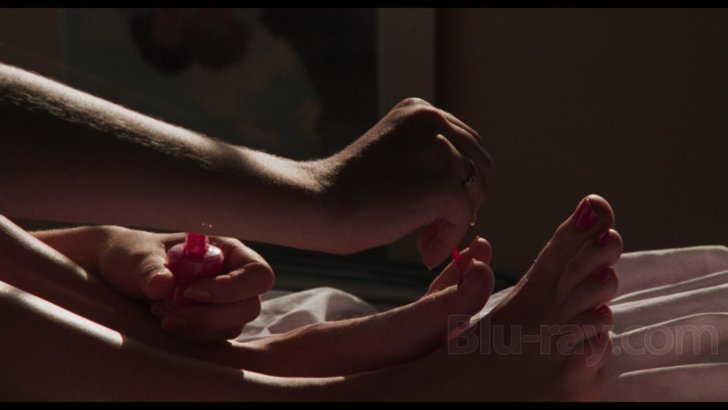
Absolutely everything that happens in Smooth Talk makes perfect sense because the catalyst behind it is bad parenting. The film is loosely based on a short story that was inspired by an article from Life magazine about an unusually nasty yet surprisingly popular character that roamed the streets of Tucson during the 1960s, but as odd it as may sound it actually functions as a cinematic textbook with a whole bunch of interesting quizzes. Even if you get one of them right it is enough to figure out exactly where the film is heading, and why. Criterion's release is sourced from an excellent new 4K master. RECOMMENDED.
Similar titles
Similar titles you might also like

Knife + Heart
Un couteau dans le cœur
2018

Reflections in a Golden Eye
Warner Archive Collection
1967

Pandora's Box
Die Büchse der Pandora
1929

Jeanne Dielman, 23, quai du Commerce, 1080 Bruxelles
1975

Laurence Anyways
2012

Sunday Bloody Sunday
1971

Broken Embraces
Los Abrazos Rotos
2009

The Lovers
Les amants
1958

My Beautiful Laundrette
1985

The Pillow Book
1996

Loulou
1980

The Handmaiden
아가씨 / Ah-ga-ssi
2016

Double Lover
L'amant double
2017

Wake in Fright
1971

Weekend
2011

My Mother
Ma mère / Slipcover in Retailer Pressing
2004

The Honeymoon Killers
1970

More
1969

Maurice
1987

Tom at the Farm
Tom à la ferme / English packaging / Version française
2013
